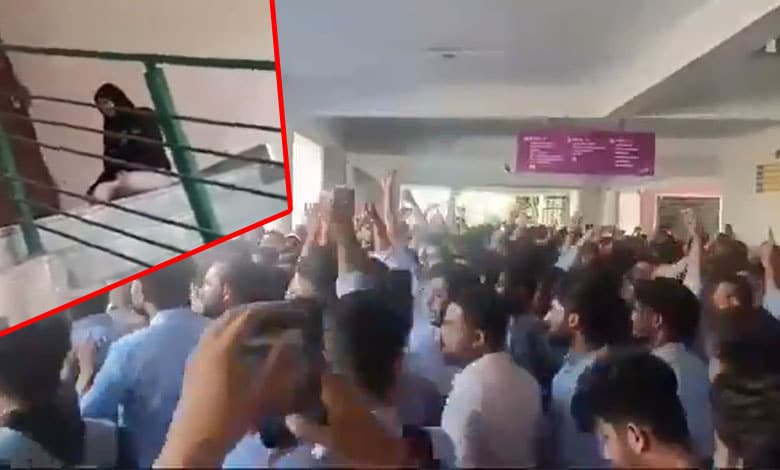Uttarakhand is currently grappling with escalating communal unrest, primarily fueled by right-wing outfits capitalising on recent “mosque disputes” in both Himachal Pradesh and Uttarakhand. The state’s inaction in preventing these tensions –in fact state functionaries have encouraged these –has emboldened hate offenders, allowing divisive agendas to gain traction. There is a growing perception that the state government indirectly supports this narrative, contributing to the polarization of communities. Attacks and violence against Muslims have surged as a result.
Huge protest erupts over namaz: Roorkee, Uttarakhand
In Roorkee, students at Quantum University ignited protests by chanting “Jai Shri Ram” in response to a video that had gone viral, showing a woman offering namaz on campus. This incident has become a flashpoint, epitomising the rising anti-Muslim hatred within the state. In the video, a large crowd of students can be seen vocally expressing their disagreement, chanting the slogan “Jai Shri Ram” as they gather in opposition to the woman’s act of offering namaz.
Reports indicate that the protesting students were in contact with the right-wing outfit Rashtriya Bajrang Dal, raising concerns about the influence of extremist groups on educational institutes. This connection highlights how external pressures can exacerbate divisions within educational institutions, turning a place of learning into a battleground for ideological conflicts, fueled by right-wing outfits across the state.
In Roorkee, Uttarakhand, a protest erupted against a woman offering Namaz at Quantum University after a video of the incident went viral. Students responded by chanting “Jai Shri Ram,” while members of Bajrang Dal claimed it was related to love jihad and conversion. pic.twitter.com/tkaz9mCJUS
— The Observer Post (@TheObserverPost) October 29, 2024
While reacting to the incident of Quantum University, senior advocate Sanjay Hegde wrote on social media platform X, that “These students have effectively devalued the employability quotient of the alumini of this university.”
These students have effectively devalued the employability quotient of the alumini of this university. https://t.co/9PCR3YNuuh
— SANJAY HEGDE (@sanjayuvacha) October 30, 2024
Right-wing leader distributed sign board: Ramnagar, Uttarakhand
Simultaneously, in Ramnagar, far-right leader Raju Rawat initiated a campaign to distribute signboards stating “Garv Se Kaho, Hum Hindu Hain” (say proudly! We are Hindus) to Hindu vendors, so that people can identify the stalls based on their religion, urging shoppers to buy only from stalls marked for “purity.”
Notably, these divisive and anti-Muslim signboards featuring “Santani Sabjiwala” have been also distributed among vegetable vendors within the Hindu community across Himachal Pradesh. By encouraging shoppers to identify vendors based on religious affiliation, these signs promote a harmful atmosphere of discrimination and segregation of Muslims on religious grounds. These signboards have been distributed in gross violation of Articles 14, 15, 19, and 21 of the Constitution and seem to go unaddressed, with no punitive actions taken by the concerned state governments.
In Ramnagar, Nainital, on October 28, far-right leader Raju Rawat again intensified communal tensions by checking the Aadhar cards of Muslim vendors, claiming that they were outsiders responsible for disrupting local businesses. His claims reflect a broader narrative that seeks to paint Muslims, particularly those labeled as “outsiders” or “Bangladeshi infiltrators,” as a threat to the local economy and community cohesion.
By framing these vendors as unwelcome intruders, Rawat is not only spreading hate but also inciting fear among the local population against the Muslims.
Srinagar, Uttarakhand
On October 27 in Srinagar, far-right leader Lakhpat Singh Bhandari led a protest rally against what he termed “love jihad,” a controversial term used to describe alleged efforts by Muslim men to convert Hindu women through marriage. During the rally, Bhandari propagated conspiracy theories surrounding this issue, making the unfounded claim that a significant number of these cases involved barbers.
Bhandari’s assertions reflect a problematic trend where unfounded accusations are used to stoke communal tensions. By specifically targeting a profession, he seeks to generalize and vilify an entire community based on the actions of a few, thereby exacerbating divisions within society.
The rise of communal and anti-Muslim protests in Uttarakhand has become increasingly evident, with rising incidents of abuse and discrimination against Muslims. The state government has failed to take preventive measures against these events, and in some cases, has seemingly promoted the distribution of discriminatory signboards, as seen during the recent Kanwar Yatra. This escalation of hate is a direct result of divisive and hateful propaganda propagated by right-wing groups.
These incidents highlight the alarming influence of extremist narratives that fuel anti-Muslim sentiments in the region. This growing hostility not only undermines the rights and dignity of individuals but also poses a serious threat to social cohesion in Uttarakhand and impact to the Muslim population of Uttarakhand.
Related:
Dehradun Press Club allows hate event “how to save women from jihadis”
Tensions escalate in Himachal and Uttarakhand, multiple protest and rallies against mosques
Tide of hatred against Muslims continues: Payment denied for Muslim server
